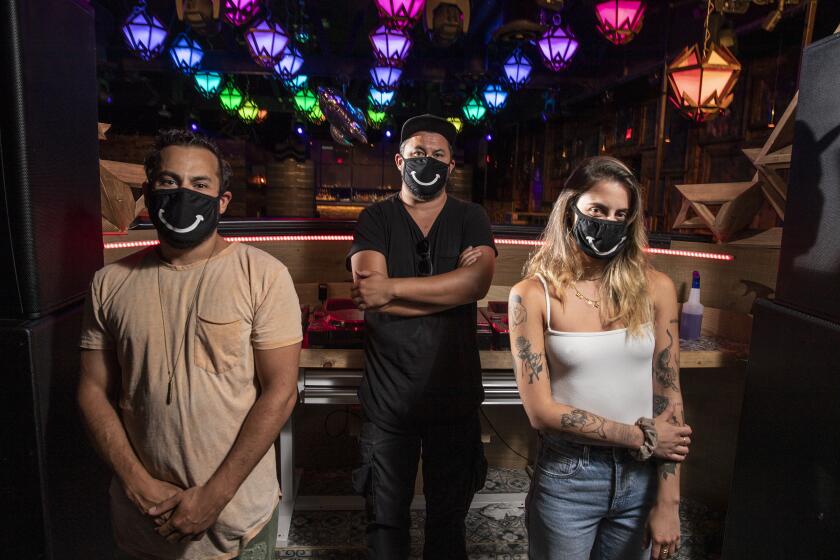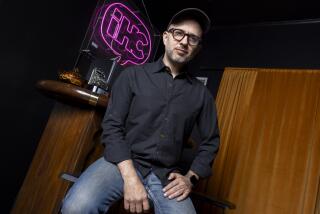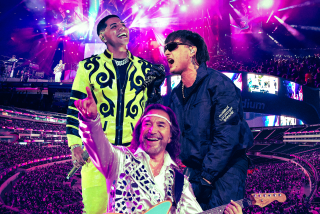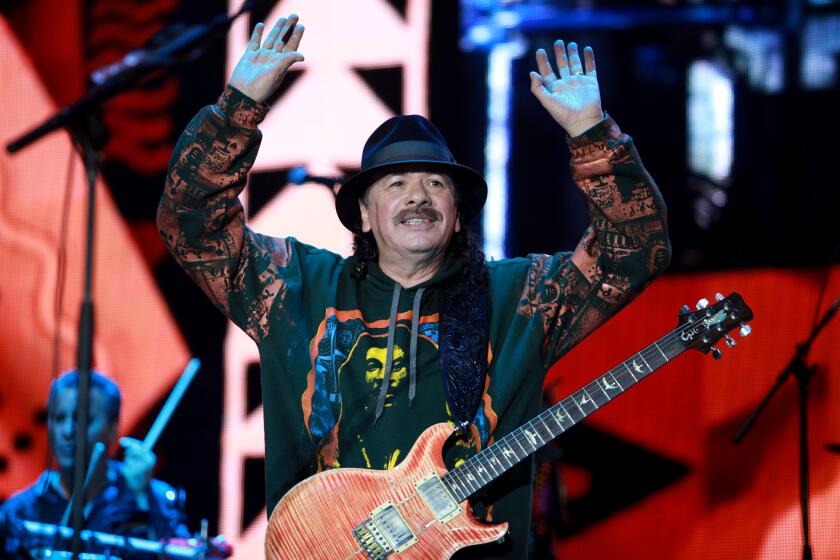As L.A. reopens, an underground dance party draws revelers and worries health experts
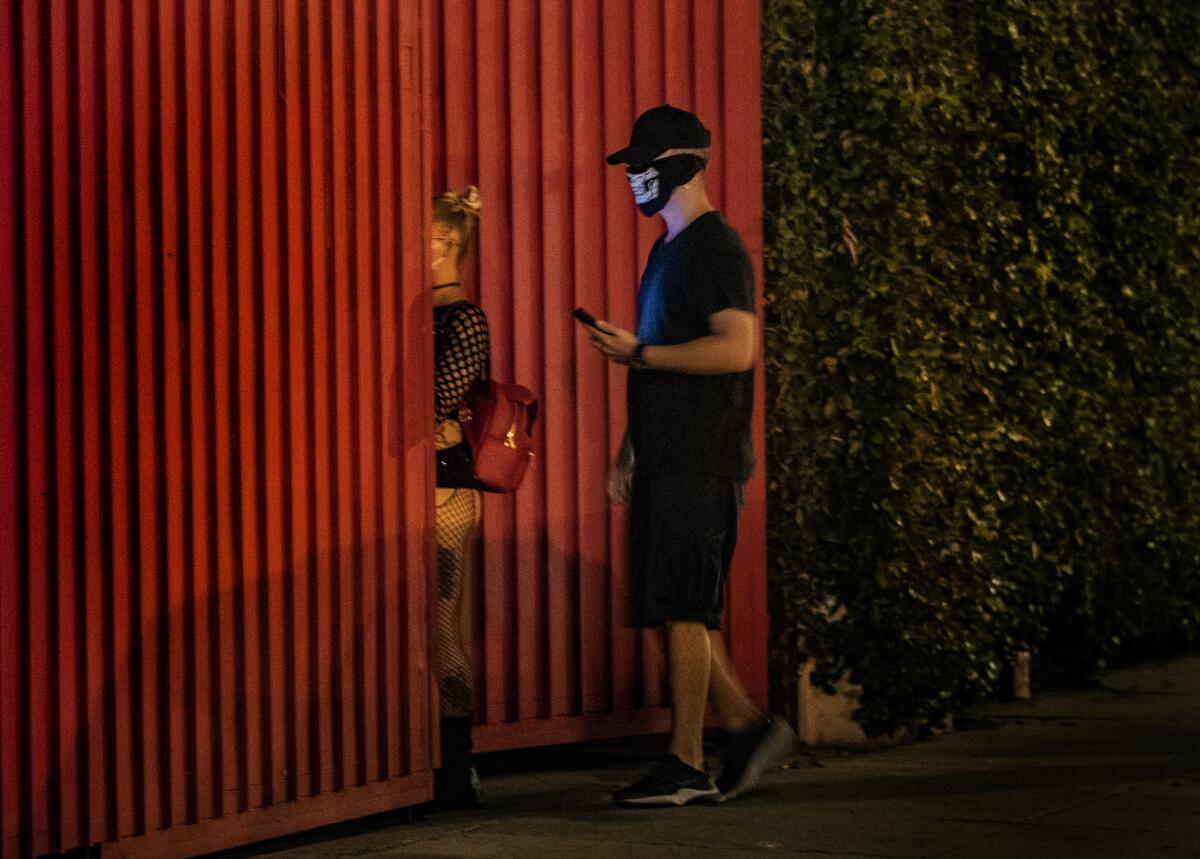
- Share via
At midnight on Friday, a security guard opened a thick steel door into a South L.A. warehouse. Unfamiliar sounds of late poured out from underneath: music, laughing and dancing. “Inside, inside,” the guard commanded, and slammed it shut behind a small line of wary but elated partygoers in paisley-print facemasks. A pink neon light beckoned them to a pair of masked ushers, who checked tickets for what was likely L.A.’s first underground club night since the coronavirus lockdowns began.
Around a dozen techno fans clustered on the small outdoor patio next to an enclosed main dance floor. The crowd wasn’t very big, at that point far fewer than 100 people. But as more guests trickled in to see the dark-techno DJ Axkan perform, some looked around in giddy disbelief that this was actually happening during a pandemic. One young woman, spritzing fellow guests with hand sanitizer as they walked in, seemed sanguine about the virus, which has claimed more than 5,000 lives in California.
“I’m not worried. I’ve been suicidal since I was a teen,” she said, in a macabre, deadpan tone. “I guess I’m just not going to hang out with my grandma for a while.”
An oral history of the coronavirus pandemic, as told by the staffs of four iconic L.A. nightclubs: the Troubadour, McCabe’s Guitar Shop, Sound and the Satellite
As COVID-19 shut down the concert industry and all nightlife in L.A. since March, artists, promoters and fans have worried that the pandemic is an existential threat to their livelihoods and culture. Some have tried to replicate the experience with livestreams or drive-in concerts, and even Coachella had to finally wave the white flag for 2020. The concert industry could see its $12.2-billion projected annual revenue all but obliterated this year, and musicians and nightlife workers often struggle to get unemployment benefits.
Although Los Angeles County’s retail stores, restaurants, museums and gyms have been allowed to resume business despite the ongoing coronavirus outbreak, concerts and music venues are still prohibited from opening under state rules and L.A. County’s Roadmap to Recovery. From major festivals to neighborhood rock clubs, no one can legally return to live events until Gov. Gavin Newsom moves the state into Phase 4 of his plan to reopen businesses.
Perhaps it was only a matter of time until someone decided to throw one anyway.
So far, there have been no reports or accounts of other L.A. concert promoters holding similar underground shows. But some promoters acknowledged they’re considering how to safely produce their own events once regulations loosen. Is throwing a renegade concert with a pandemic still ripping through California, as the young woman put it, “suicidal” or inevitable, given that restaurants, churches and casinos are filling up anyway?
For public health professionals, even those who are sympathetic to mass gatherings like the recent protests against police brutality, congregating at a party indoors is a head-spinning gamble.
“Frankly, I think these are a terrible idea,” said Dr. Tara C. Smith, an epidemiologist and professor at Kent State University’s College of Public Health, who has written and spoken widely on COVID-19 and its transmission risks. “I understand that everyone wants to get back to normal, but being in a small enclosed area in close contact with many others is one of the highest-risk activities one can do.”
California is slowly reopening, providing hope that you might soon see your favorite artist in concert. But from an arena stage? A computer screen? A drive-in?
Organizers for Friday’s show, which was called Technometrik, were discreet about advertising it, knowing that they lacked permits for such an event. But they did make an online promotion with contact information, and anyone over 21 could buy a $20 pass to attend through the popular event-ticketing platform Resident Advisor.
Inside the venue, promoters took many of the obvious precautions. Masks were mandatory and hand sanitizer was abundant. The 100-person crowd was well below capacity, even on the main dance floor, and the DJ’s stage was set way back from fans.
Smith, when told about the safety measures, was not convinced such measures were enough.
“Masks on everyone could help reduce the risk a bit, but even if many in the crowd were wearing them, I suspect they’d pull them down to talk, likely in very close proximity if the music is loud. Many would take them off to drink as well,” she added. “Will the [artist] be behind plexiglass? Tested for virus before performing? How are they being protected from the crowd and the crowd from them? We know that singing and shouting appear to help spread the virus farther than mere breathing or talking, which introduces additional risk.”
The event’s promoter, Xavier Perez, declined comment when reached by phone. But the headlining DJ, veteran L.A. techno producer Axkan (the alias of Federico Sánchez Leyva), said he felt confident in the party’s security measures and was happy to play.
“I was clear with the promoter that if it doesn’t look safe I’m going to have to cancel,” he said. “When I got there, I was worried it would be packed, but everyone had enough space to walk, and the stage was secluded in the back, with a big opening to the outdoors. It felt safe enough. I was a little worried in the morning, like, ‘Am I OK?’ But to be honest, it felt great.”
Sánchez Leyva, who has produced and performed electronic music for two decades and toured across the globe, said he was sympathetic to techno fans starving for community, and to artists who desperately need to play to make a living.
“This was the longest I’ve ever not played in five years. But I was worried as well. I’m not 20, and the older you are there are more chances of [the virus] getting worse,” he said. “I was a little nervous but I also wanted to support the techno community. Everyone’s eager to get out there. Safety is everyone’s responsibility. The promoter has to do their best, but you’re responsible for your own safety.”
Several other established promoters in the L.A. underground had mixed reactions to the idea of throwing a club night while COVID-19 rages. None would speak on the record about the specific event, but when told about the party, many used words like “reckless,” “unnecessary,” “surprised” or, more succinctly, “wow.” Some said they’d been exploring the possibility that an outdoor, distanced event might be possible in the next few months, but would not throw a show like this right now. Others also lamented that total COVID-19 social-abstinence is impractical, and the virus has become a way to prove your righteousness through isolation.
Fans going into Friday’s event were often reluctant to say how they felt about it. One young masked partygoer, who introduced himself as Alan, said, “This feels pretty safe, they seem to be following every precaution.” Some treated it like any other night out: One young woman in sci-fi raver attire ordered a delivery burrito to her car parked outside the venue before going in.
Promoter Goldenvoice announced April 2021 dates for the Coachella and Stagecoach festivals, which were canceled by Riverside Country officials on Wednesday
Sacha Lopez, a 30-year-old dance music fan from L.A., said outside the party gates that underground techno was her main social community, and she’d been suffering without its comradeship. “This is a celebration, it’s a beautiful feeling to be here,” she said. “It’s been so devastating to be without this. You do everything you can to be safe, but at some point, you have to take that chance.”
Most established L.A. underground club promoters, even if their events aren’t fully permitted, take a range of precautions to ensure fan safety, especially after the 2016 Ghost Ship venue fire in Oakland, which killed 36 people. Such shows are an essential part of queer, multiracial music culture in L.A., and set the tone for bigger events like the Coachella Valley Music and Arts Festival. Organizations like the Los Angeles Nightlife Alliance have emerged to advocate for the scene and promote best practices for safety.
But the pandemic has scrambled any sense of what “safe” means when large gatherings like concerts are banned to prevent the spread of a deadly virus. Nightlife will resume someday, but it’s clear that L.A. should be prepared for some kinds of concerts returning ahead of schedule.
“I was scheduled to attend several concerts this summer, and am bummed to have to wait,” Smith said. “But I think this is just going to be one more venue for the virus to spread.”
More to Read
The biggest entertainment stories
Get our big stories about Hollywood, film, television, music, arts, culture and more right in your inbox as soon as they publish.
You may occasionally receive promotional content from the Los Angeles Times.
